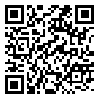Sun, Feb 22, 2026
Articles In Press
Back to the articles list |
Back to browse issues page
Bahman Norouziyan1 
 , Mahdi Yadollahzadeh2
, Mahdi Yadollahzadeh2 
 , Alireza Akbarzadeh Baghban3
, Alireza Akbarzadeh Baghban3 
 , Aryan Shamili4
, Aryan Shamili4 
 , Noureddin Nakhostin Ansari5
, Noureddin Nakhostin Ansari5 
 , Alireza Shamsoddini *6
, Alireza Shamsoddini *6 


 , Mahdi Yadollahzadeh2
, Mahdi Yadollahzadeh2 
 , Alireza Akbarzadeh Baghban3
, Alireza Akbarzadeh Baghban3 
 , Aryan Shamili4
, Aryan Shamili4 
 , Noureddin Nakhostin Ansari5
, Noureddin Nakhostin Ansari5 
 , Alireza Shamsoddini *6
, Alireza Shamsoddini *6 

1- Department of Occupational Therapy, School of Rehabilitation, Shahid Beheshti University of Medical Science, Tehran, Iran.
2- Department of Internal Medicine, School of Medicine, Firoozgar General Hospital, Iran University of Medical Sciences, Tehran, Iran.
3- Proteomics Research Center, Department of Biostatistics, School of Allied Medical Sciences, Shahid Beheshti University of Medical Sciences, Tehran, Iran.
4- Department of Occupational Therapy, Faculty of Rehabilitation, Tehran University of Medical Sciences, Tehran, Iran.
5- Sports Medicine Research Center, Tehran University of Medical Sciences, Tehran, Iran.
6- Exercise Physiology Research Center, Life Style Institute, Baqiyatallah University of Medical Sciences, Tehran, Iran.
2- Department of Internal Medicine, School of Medicine, Firoozgar General Hospital, Iran University of Medical Sciences, Tehran, Iran.
3- Proteomics Research Center, Department of Biostatistics, School of Allied Medical Sciences, Shahid Beheshti University of Medical Sciences, Tehran, Iran.
4- Department of Occupational Therapy, Faculty of Rehabilitation, Tehran University of Medical Sciences, Tehran, Iran.
5- Sports Medicine Research Center, Tehran University of Medical Sciences, Tehran, Iran.
6- Exercise Physiology Research Center, Life Style Institute, Baqiyatallah University of Medical Sciences, Tehran, Iran.
Abstract: (1065 Views)
Purpose: COVID-19 is associated with a wide range of psychological effects, including heightened levels of anxiety and fatigue, in addition to its negative impact on the physiological systems. This study was conducted to investigate the effect of smartphone-based respiratory biofeedback on anxiety and fatigue in patients with COVID-19.
Methods: In this experimental study, 76 COVID-19 patients hospitalized in the intensive care unit of Firouzgar Hospital, Tehran, were assigned to intervention and control groups. Intervention group received routine medical care supplemented with respiratory biofeedback breathing exercises delivered via smartphone. Each session lasted 30 minutes, conducted twice daily, for a total of 10 sessions. Control group received only routine medical treatment. Fatigue was assessed using the Multidimensional Fatigue Inventory (MFI), and anxiety levels were measured with the Spiel Berger State-Trait Anxiety Inventory.
Results: Following the intervention, patients in the biofeedback group experienced a significantly greater reduction in fatigue and anxiety compared to the control group (P < 0.05). The control group, which received routine treatment alone, also demonstrated some improvement in symptoms (P < 0.05).
Conclusion: The findings indicate that smartphone-based respiratory biofeedback is effective in reducing both anxiety and fatigue among patients with COVID-19. This intervention, when integrated with standard medical care, offers significant psychological and physical symptom relief, highlighting its potential as a valuable non-pharmacological addition to comprehensive COVID-19 patient management strategies.
Methods: In this experimental study, 76 COVID-19 patients hospitalized in the intensive care unit of Firouzgar Hospital, Tehran, were assigned to intervention and control groups. Intervention group received routine medical care supplemented with respiratory biofeedback breathing exercises delivered via smartphone. Each session lasted 30 minutes, conducted twice daily, for a total of 10 sessions. Control group received only routine medical treatment. Fatigue was assessed using the Multidimensional Fatigue Inventory (MFI), and anxiety levels were measured with the Spiel Berger State-Trait Anxiety Inventory.
Results: Following the intervention, patients in the biofeedback group experienced a significantly greater reduction in fatigue and anxiety compared to the control group (P < 0.05). The control group, which received routine treatment alone, also demonstrated some improvement in symptoms (P < 0.05).
Conclusion: The findings indicate that smartphone-based respiratory biofeedback is effective in reducing both anxiety and fatigue among patients with COVID-19. This intervention, when integrated with standard medical care, offers significant psychological and physical symptom relief, highlighting its potential as a valuable non-pharmacological addition to comprehensive COVID-19 patient management strategies.
Send email to the article author
| Rights and permissions | |
 |
This work is licensed under a Creative Commons Attribution-NonCommercial 4.0 International License. |



